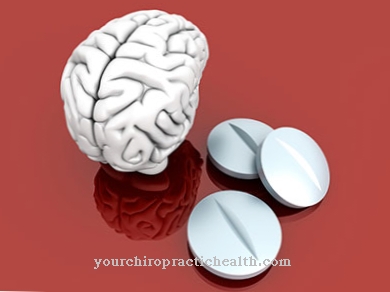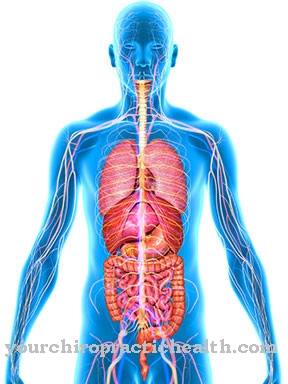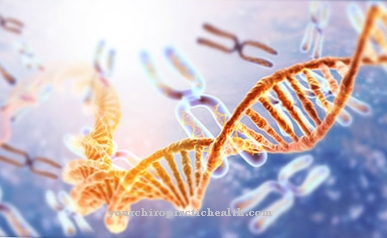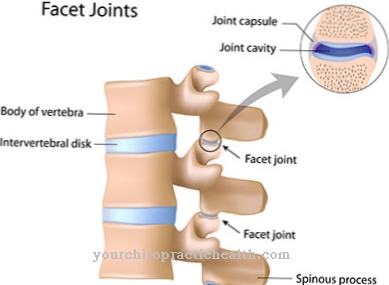In this country, people like to consume a lot of coffee. Especially in everyday office life it is impossible to imagine life without this wake-up call. But it is not just excessive consumption of coffee that leads to addiction, Caffeinism This is also known as the effect of other beverages containing caffeine such as energy drinks and teas.
What is caffeinism?

© ram69 - stock.adobe.com
The term caffeinism has two meanings. On the one hand, it describes a caffeine overdose that results in poisoning. On the other hand, it describes in colloquial language a coffee addiction or an abuse of other beverages containing caffeine. If there is caffeinism, the person affected must constantly supply the body with the usual dose of caffeine.
In today's society, caffeine addiction is still not taken as seriously as nicotine or alcohol addiction. In spite of the trivializing of caffeine addictions, caffeine in very large amounts can be deadly. Its lethal limit is around ten grams. This corresponds to about 200 cups of double espresso.
causes
Caffeinism comes about when the body is regularly supplied with large amounts of caffeine in the form of coffee, tea, cola or energy drinks. But sometimes it also happens that the body does not get the usual dose of caffeine. And if the amount of caffeine is not enough, the first withdrawal symptoms will appear soon. These can be very uncomfortable for those affected.
But with a little patience, the body can get used to the change on its own. The symptoms go away on their own once the body has got used to the caffeine withdrawal. The second definition of the term caffeinism is caffeine intoxication. This is due to the intake of a very large amount of caffeine in a short time.
Symptoms of poisoning occur with around one gram of caffeine. This amount is reached when ten liters of commercial cola or twelve cans of 250 milliliters of energy drinks are consumed at once.
You can find your medication here
➔ Medicines against tiredness and weaknessSymptoms, ailments & signs
If there is a caffeine addiction, the person concerned often suffers from insomnia, nervousness and hyperactivity, as if the body were constantly electrified. The stimulating effect of caffeine may also lead to increased heart activity and high blood pressure. Chronic headaches can also be the result of caffeine addiction.
Withdrawal symptoms, on the other hand, express themselves in a contrasting picture to the dependence symptoms. The person reacts to the sudden caffeine withdrawal with permanent tiredness, depression, slowed movement sequences and states of exhaustion. The appetite, on the other hand, can increase so much that a large amount of food is necessary to reduce the craving for the addictive substance. Often times, caffeine withdrawal also triggers bizarre and uncomfortable dreams.
And finally, acute caffeine poisoning usually has serious health consequences. These range from tachycardia to cardiac arrhythmia. There are also disorders of the central nervous system. Depressive moods, listlessness, poor concentration and uncontrolled movements are just a few of the many complaints.
Diagnosis & course
Coffee or caffeine addiction is usually not diagnosed as long as the body is given the same ration of caffeine over and over again. Because the dependency symptoms are often not perceived as such, but rather associated with other causes. The first withdrawal symptoms do not set in until about 12 to 24 hours after the last cup of coffee or the last caffeine consumption.
This is the case, for example, when a person has to completely avoid caffeine as part of a fasting cure or medical procedure. During a weaning process, the symptoms feel very unbearable for the first two to three days. Once the worst phase is over, the withdrawal symptoms subside for another four to six days. These then pass by themselves after about seven to nine days.
Those who show patience will also be rewarded with successful weaning. Acute caffeine poisoning, on the other hand, occurs quickly, namely with more than one gram of caffeine or after the amount of caffeine tolerated by the body is exceeded. The first symptoms of intoxication can be followed by a circulatory collapse in severe caffeine poisoning. If you suspect caffeine poisoning, you should therefore always consult a doctor as soon as possible.
Complications
Various complications can arise with caffeinism, which depend heavily on the amount of coffee consumed. In addition, the physical and mental state of the person concerned also play a large role in the effects of caffeinism.Usually, a high dose of caffeine is followed by a mental disorder.
This occurs primarily in the form of restlessness, the need to urinate and insomnia. If the poisoning is very severe, the caffeinism can also lead to circulatory collapse. The heart rate is increased so that the patient experiences increased palpitations. Concentration does not necessarily have to be disturbed with caffeinism, it can also increase.
However, above a certain amount of caffeine it decreases. Poisoning also leads to symptoms of anxiety, often diarrhea and headaches, as well as uncontrolled twitching. If a high amount of caffeine has been consumed over a long period of time, this can also lead to muscle paralysis. The lethal dose in caffeinism is ten grams for the human body.
The treatment removes all caffeine intake from the body. This usually leads to severe withdrawal symptoms such as tiredness, increased appetite or sleep disorders, as well as very unpleasant dreams. Caffeinism is rarely treated in withdrawal. In most cases, weaning is done by the patient himself.
When should you go to the doctor?
Acute caffeine poisoning usually goes smoothly even without medical treatment. A healthy adult is only at risk of death from a dose of around 10 grams of pure caffeine. This amount cannot be absorbed through normal stimulants, including so-called energy drinks.
Those who have consumed too much coffee or black tea usually notice symptoms such as irritability, frequent urination, tremors, insomnia and occasionally severe headaches. These symptoms usually subside on their own after a few hours at the latest if the person concerned cuts off the caffeine intake. A doctor's visit is not necessary in these cases.
However, caution is advised in children and adults with previous illnesses. Anyone who suffers from severe cardiovascular disease or has already had a heart attack should consult a doctor as a precaution if they suspect acute caffeine poisoning. The same applies if the poisoning is due to misuse of caffeine tablets or other caffeine-containing drugs. Then there is a risk that the lethal dose will be reached. In such cases, the emergency doctor should be informed immediately.
In addition to poisoning with the substance, caffeinism also describes a state of caffeine dependence. Unless it causes other serious disorders, such as gastric mucosal inflammation, this is not considered dangerous. Anyone suffering from the addiction, however, physically or mentally, should seek professional help. The first point of contact is the family doctor.
Doctors & therapists in your area
Treatment & Therapy
Clearly, acute caffeine poisoning needs to be treated by a doctor. The situation is different when you stop caffeine addiction. This can also be done without medical supervision. Then a lot of rest and patience is required. Consciously avoiding any form of caffeine is very important, as relapse would ruin your progress. All herbal and fruit teas are allowed, but under no circumstances are teas containing caffeine such as green and black teas.
Regular sports units or an exciting hobby are suitable for distracting yourself from the craving for caffeine. Of course, this stimulant can be consumed in moderation again after successful withdrawal. If you start again with light doses and do not consume more than three cups of coffee or 400 mg of caffeine a day, you will not quickly become addicted again.
Those who only suffer from coffee addiction, but not from caffeine addiction in general, can switch to decaffeinated coffee, for example. This addresses the reward center in the same way as normal coffee, but without burdening the mind and body with caffeine.
Outlook & forecast
Patients with caffeinism have a good prospect of recovery when taking therapy. In caffeinism, a distinction must be made between addiction to caffeine and caffeine overdose. An overdose is usually completely cured within a short time. By consuming water or emptying the stomach, the symptoms decrease within a few hours. Most of the time, healing occurs after one day if there are no risk factors.
The caffeine is removed from the body and the existing symptoms are alleviated at the same time. If you are addicted to caffeine, the path to recovery is significantly longer. In many cases the patient needs several months or years to be completely free of symptoms. Nevertheless, healing is possible with cooperation and the will of the patient.
Often the patient suffers from further addiction symptoms. These can relate to material or immaterial substances. As with other addictions, there is also a risk of relapse with caffeinism. The more stable the patient is integrated in his social life and the less his general stress experience, the faster healing will take place. There is also a prospect of recovery for patients who do not seek medical or therapeutic help. The healing process is often delayed in these patients, but it is quite successful.
You can find your medication here
➔ Medicines against tiredness and weaknessprevention
In order for caffeinism not to develop in the first place, the coffee drinker must adhere to a few preventive measures. The risk of addiction arises when a certain pattern is repeated over and over again. Creating variety is the motto here. If you cover the morning dose of caffeine not only with coffee, but also with a delicious tea, you can prevent coffee addiction.
And the afternoon coffee cup could be replaced with decaf coffee. In this way, the daily intake of caffeine can be reduced and the risk of addiction avoided. A walk in the fresh air or a short break for a gossip with a colleague usually helps against tiredness or a lunchtime low.
Aftercare
Caffeinism is rarely treated professionally. For this reason, former caffeine addicts are usually left on their own when it comes to aftercare. Since caffeine has no serious physiological consequences for physically healthy adults, a reduced consumption is possible in the long term. However, some caffeinists find it easier to completely abstain. However, if people want to continue drinking caffeinated beverages, they should set a limit, for example two cups of coffee a day.
Former caffeinists can set themselves appointments during aftercare to check their caffeine consumption. The following questions are helpful:
- How Much Caffeine Do I Consume Per Day / Week / Month?
- How do I consume caffeine?
- How often?
- On what occasions?
- Why do I drink coffee or something similar? Out of habit, stress or pleasure?
- What if I don't consume caffeine for a few days / weeks?
By repeating the questions regularly, those affected can observe whether their caffeine consumption has changed. The answers should therefore be written down. In this self-test, responses that indicate high and frequent caffeine consumption are critical.
Caffeine tablets are more problematic than a cup of mate tea or a few pieces of chocolate. If former caffeinists mainly consume caffeine out of habit and stress or experience withdrawal symptoms without caffeine, it is time to cut back on caffeine consumption and, if possible, combat the causes.
You can do that yourself
In our society, caffeinism is not taken nearly as seriously as alcohol addiction or nicotine addiction. Caffeinism is also far less dangerous. Those affected who notice a dependency on coffee or other caffeinated products should nevertheless take countermeasures.
The first thing you should do is determine your daily caffeine intake. It should not be overlooked that the substance is not only contained in coffee beans, but also in tea, many soft drinks and, above all, in so-called energy drinks.
Anyone who notices symptoms of caffeinism such as insomnia, nervousness and hyperactivity, even though they are not consuming any caffeinated beverages, should check medications, especially headache pills and dietary supplements, for the ingredients.
As a rule, caffeine addiction does not have to be treated professionally. It is sufficient if the person concerned reduces the caffeine intake when the first symptoms appear. The daily dose should be slowly reduced, otherwise unpleasant withdrawal symptoms can threaten.
Many coffee drinkers usually lack not only the stimulating substance, but also the habit itself, especially the ritual of coffee preparation and the cup in hand or on the desk. This group of people is helped by substitute products that are offered on a grain basis. Malt and spelled coffee are particularly tasty and wholesome. Decaffeinated coffee beans is also available, but it is less stomach-friendly than the grain-based alternatives.













.jpg)

.jpg)
.jpg)











.jpg)